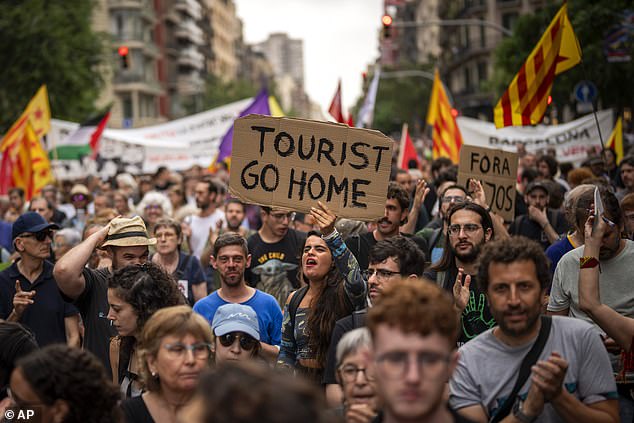The Spanish government has unveiled drastic reforms affecting Britons’ ability to buy homes as the state desperately tries to tackle the deepening housing crisis.
Prime Minister Pedro Sánchez today announced a new package of 12 measures that the government hopes will win over residents angry at the lack of available homes.
One controversial proposal is the introduction of a tax on non-EU nationals buying homes in the country they do not already live in Spain.
The government proposed that a tax on foreigners, including Britons, be levied by increase the amount paid with the purchase of a house up to 100 percent of the value of the property.
Homebuyers in Spain are currently expected to pay costs and taxes worth between 10 and 12 percent of the price of the home, depending on where it is.
Sanchez said the new rate would help “prioritize the availability of housing for residents.”
He noted that in 2023 non-residents from outside the EU alone bought 27,000 houses and flats in Spain, ‘not to live in but mainly to speculate’.
He said it was ‘something we, in the context of the shortages we are experiencing, cannot afford’.
Spain has seen large protests grow year-on-year, with aggrieved locals decrying the housing shortage while opportunists buy houses and rent them out to holidaymakers, or leave them empty for most of the year.
Residence in Spain is open to UK citizens and other non-EU nationals planning to stay longer than 90 days, subject to fees and proof of financial stability.

Protesters march and shout slogans against the Formula 1 Barcelona fan festival in downtown Barcelona, Spain, on Wednesday, June 19.

Demonstrators hold a banner reading “Mallorca is not for sale” during a demonstration to protest the massification of tourism and house prices on the island of Mallorca in Palma de Mallorca on May 25, 2024

Spanish Prime Minister Pedro Sanchez speaks in Madrid on January 8, 2025
Sanchez’s radical plan to address the housing crisis was unveiled today, outlining 12 measures focused on reforming the construction industry, ensuring affordable rents and offering incentives to those who follow rental guidelines.
This includes the transfer of land to a new Public Housing Company which the government says it will use to build thousands of new affordable rental homes.
Sanchez said in the first half of this year, the company will begin incorporating more than 30,000 Sareb homes, about 13,000 with immediate effect.
The government also hopes to ‘rehabilitate’ empty homes for additional ‘affordable rent’, offering incentives to those who renovate flats and make them available for an extended period.
He hopes that an income tax exemption for owners who rent out their homes according to the ‘Reference Price Index’ will encourage a healthier rental ecosystem.
In a bid to ensure Spaniards can access homes before wealthy non-EU citizens, the proposals also include a measure to ‘limit’ the purchase of homes by people ‘not living in our country’.
This should be tightened with regulations on seasonal rental fraud, discouraging those who illegally try to make the most of Spain’s lucrative tourist season.
‘The goal with all these measures is clear. What we want is to protect citizens, to find a better balance between tourism and investment, which are two key activities for our economy,’ Sanchez said in the announcement.
‘And also, logically, access to housing, which is a constitutional right of the people and a legitimate objective of our Government if we say that we want to make it the fifth Pillar of the welfare state.’

Protesters in Alicante rally against over-tourism in the Spanish city in July 2024

A sign during a demonstration in Alicante reads ‘our house is not the patio of the gringos’

It comes after protesters sprayed water cannons at tourists eating at popular spots in Barcelona
Sanchez assured that the increased power given to the state to buy properties and land will be backed by a guarantee ensuring that all housing built by the state remains public property indefinitely.
The aim of the ambitious plan is that ‘what is built and rehabilitated with public money will always remain the property of the Spanish people and will not end up in the hands of vulture funds’, he insisted.
The government hopes to mobilize around 6 billion euros in ICO loans and guarantees to help build an additional 25,000 new homes.
While the government itself is building more homes, the government is also targeting private businesses that engage in unsustainable rental practices.
Sanchez insisted on the need to prioritize residential use over tourism, promising to introduce a tax reform ‘so that tourist apartments are taxed as what they are, a business’.
He said that ‘it is not fair that those who have three, four, five apartments for short-term rent pay less tax than hotels or workers’.
Jaume Collboni, the mayor of Barcelona, set a precedent with the radical decision to get rid of all short-term apartment rentals for tourists from November 2028.
Companies like Airbnb have long been in the crosshairs of anti-tourism protesters, with residents fearing they are being priced out of homes by the glut of property owners who rent out their homes for huge fees.

Residents of Tenerife hold placards raising concerns about the impact of mass tourism, October 2024

A row of apartments in Barcelona today. Many local residents fear the impact of short-term rentals and foreign nationals buying houses for speculation

Anti-tourism graffiti in Barcelona has seen a resurgence amid recent protests
For the six months to the end of June last year, during the busy summer period, 42.5 million international visitors traveled to the country.
June alone recorded a 12% rise to 9 million as the busier summer period ramps up, according to Spain’s data agency INE.
Data shows that visitors are increasingly choosing to stay in rental apartments, rather than hotels, increasing demand for apartments and encouraging landlords to buy up housing at the expense of residents.
The number of visitors to Spain in the first half of the year who stayed in that type of accommodation rose by 30%, while those staying in hotels rose by 11%.
The first major demonstration in Alicante took place last Julywith hundreds of locals taking to the streets to voice their concerns about over-tourism.
Scores of residents met at the central Plaza Toros with banners and flags reading ‘Leave our neighbourhoods’, ‘our house is not the patio of gringos’ and ‘f*** AirBnB’ amid fears locals would be forced out of their homes be praised and trapped. in unstable jobs catering to foreign visitors.
Salva, a spokesperson for the group organization, told MailOnline: ‘It is the administrations (city council, autonomous community, central government) that must take measures to put the needs of the people living in the city at the forefront, in comparison with the wishes of those visiting the city.
“We hope that the demonstration is the first step so that more people feel that it is legitimate to demand the right to live with dignity in our city, and to be able to join together to build a neighborhood movement that says that Alicante does not for sale.’

A sign reads ‘F*** AirBnB’, expressing frustration with the holiday home rental company

Chains have been introduced across paths in the town of Binibeca in Menorca to prevent visitors from intruding into the private spaces of residents at certain times

Critics say overtourism has negatively affected job and housing opportunities in Spain
Earlier this month, residents in Barcelona shockingly fired water cannons at tourists enjoying dinner on a street popular with foreign visitors.
Under the banner ‘Enough! Let’s put restrictions on tourism’, some 2,800 people – according to the police – marched along a waterfront district of Barcelona to demand a new economic model that would reduce the millions of tourists who visit each year.
Barcelona’s rising cost of housing, which has risen by 68 percent in the past decade, is one of the main issues for the movement, along with the effects of tourism on local trade and working conditions in the city of 1.6 million inhabitants.
Rents rose 18% in June from a year earlier in tourist cities such as Barcelona and Madrid, according to property website Idealista.





